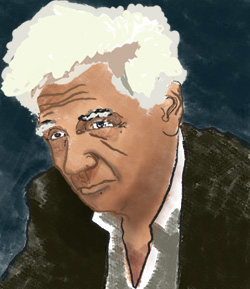Jacques Derrida: Idézetek angolul
Cogito and The History of Madness, p.37 (Routledge classics edition)
Writing and Difference (1978)
Cogito and The History of Madness (Routledge classics edition)
Writing and Difference (1978)
"The Ends of Man," Margins of Philosophy, tr. w/ notes by Alan Bass. The University of Chicago Press. Chicago, 1982. (original French published in Paris, 1972, as Marges de la philosophie). p. 116
Specters of Marx (1993), 1970s
Plato's Pharmacy, intro
Dissemination (1972)
Plato's Pharmacy
Dissemination (1972)
Derrida (2003 documentary), referring to his personal library
Specters of Marx (1993), 2000s
We have heard this and we will hear it again.
Injunctions of Marx
Specters of Marx (1993)
“I am one of those marranes who no longer say they are Jews even in the secret of their own hearts.”
"Circumfession." In Jacques Derrida, eds. G. Bennington & J. Derrida, trans. G. Bennington. Chicago: University of Chicago Press, 1993, p. 170
The animal looks at us, and we are naked before it. Thinking perhaps begins there.
Specters of Marx (1993), The Animal That Therefore I Am, 1997
"The Ends of Man," Margins of Philosophy, tr. w/ notes by Alan Bass. The University of Chicago Press. Chicago, 1982. (original French published in Paris, 1972, as Marges de la philosophie). p. 123
“Circumcision, that’s all I’ve ever talked about.”
"Circumfession." In Jacques Derrida, eds. G. Bennington & J. Derrida, trans. G. Bennington. Chicago: University of Chicago Press, 1993, p. 70
Plato's Pharmacy, Pharmacia
Dissemination (1972)
Cogito and The History of Madness, p.37 (Routledge classics edition)
Writing and Difference (1978)
